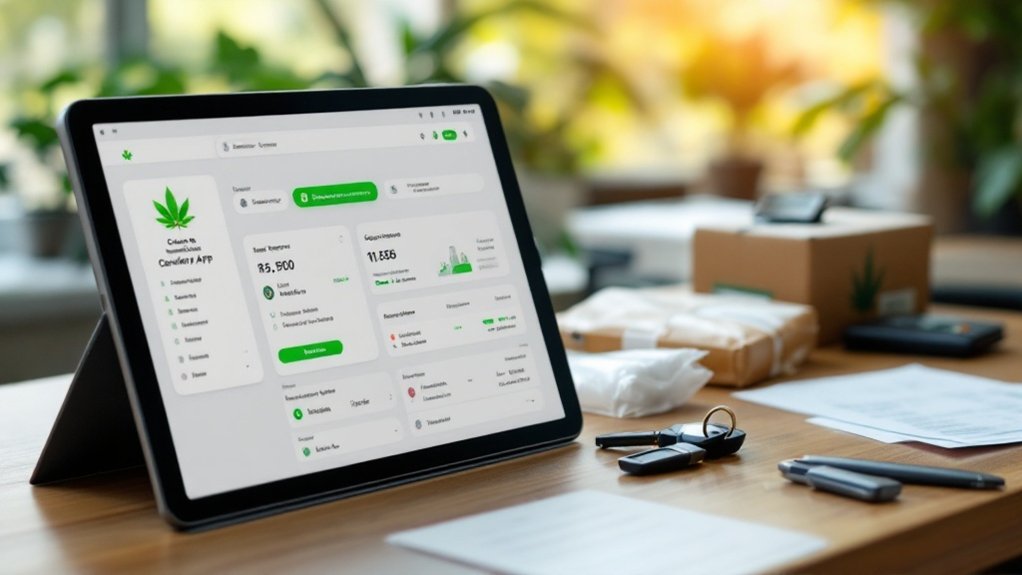Starting a cannabis delivery service requires selecting a business model (independent service, dispensary delivery, or eCommerce platform) and researching state and local regulations. Entrepreneurs must secure proper licensing, develop age verification processes, and establish appropriate funding sources since traditional banks often avoid cannabis businesses. Operational infrastructure necessitates compliant storage facilities, GPS-tracked delivery vehicles, and inventory tracking software. Building a qualified team familiar with compliance requirements guarantees smooth operations. The thorough planning process addresses unique challenges while positioning businesses to meet growing consumer demand.

Launching a cannabis delivery service requires careful maneuvering through complex regulations, thorough market analysis, and strategic business planning. The first essential step involves deciding which business model to pursue—independent delivery services, dispensary delivery services, or eCommerce delivery platforms. Each model presents different opportunities and challenges in this rapidly evolving industry, where increasing legalization across states has created substantial market potential.
Starting a cannabis delivery business demands navigating regulatory complexity while strategically positioning your service in this emerging market landscape.
Understanding the legal landscape forms the foundation of any cannabis delivery venture. Entrepreneurs must research state-specific regulations governing cannabis delivery operations, as these vary considerably across jurisdictions. This research should include age verification requirements, typically mandating delivery to individuals over 21 with valid identification, and local municipality regulations which often impose additional restrictions beyond state laws. Obtaining proper licensing from both local and state authorities is non-negotiable before commencing operations.
Financial planning presents unique challenges in the cannabis sector. Traditional banking institutions frequently hesitate to provide loans for cannabis businesses, necessitating alternative funding sources such as seed capital or private investors. A thorough business plan that addresses regulatory compliance, market analysis, and operational strategy can help attract potential investors. Establishing a relationship with an accountant familiar with cannabis industry regulations is essential for maneuvering complex tax requirements specific to this sector.
Building the operational infrastructure requires securing appropriately zoned office space, establishing compliant storage facilities, and acquiring suitable delivery vehicles equipped with GPS tracking systems. The installation of vehicle GPS tracking allows real-time monitoring of delivery vehicles, enhancing driver safety and improving customer satisfaction through accurate delivery estimates. Technology solutions play a vital role in operations, including user-friendly ordering platforms, courier management systems, inventory tracking software, and robust age verification processes. These systems must seamlessly integrate to guarantee efficiency and compliance.
Developing a sound operational strategy includes defining delivery boundaries, establishing relationships with licensed suppliers, creating standard operating procedures, and implementing security protocols for product handling during transit. Current industry statistics show that approximately 44% of medical marijuana consumers depend on weed delivery services, highlighting the significant market opportunity.
The final components involve marketing within industry-specific advertising limitations and building a qualified team familiar with compliance requirements. Partnerships with licensed manufacturers and cultivators guarantee product quality and consistency.
The cannabis delivery market presents substantial opportunities for entrepreneurs willing to maneuver its complex regulatory landscape. Success in this industry depends on meticulous attention to legal compliance, operational excellence, and the ability to adapt to rapidly evolving regulations while meeting growing consumer demand for convenient access to cannabis products.
Frequently Asked Questions
Can I Start a Cannabis Delivery Service With a Criminal Record?
Criminal records can impact cannabis delivery service eligibility, though specific restrictions vary by state.
Felony convictions, particularly those involving fraud or drug trafficking, typically present significant barriers. Some jurisdictions differentiate between violent and non-violent offenses, with marijuana-related convictions sometimes receiving more lenient treatment.
Expungements, Certificates of Good Conduct, or waiting periods of 2-3 years following conviction may restore eligibility.
Professional background checks and legal counsel are recommended before pursuing licensing applications.
How Much Insurance Coverage Do Cannabis Delivery Services Typically Need?
Cannabis delivery services typically require an extensive insurance portfolio with general liability coverage of at least $1-2 million per occurrence, commercial auto insurance of $1 million or higher, and product liability coverage starting at $1 million per claim on average.
Workers’ compensation is legally mandated in most states, while cyber liability coverage usually begins around $100,000.
Coverage requirements vary based on state regulations, fleet size, payroll, and the specific risk profile of the business operations.
What Security Measures Are Required for Transporting Cannabis Products?
Cannabis transportation requires thorough security measures mandated by regulations.
These can include GPS tracking, internal and external camera systems, and 24/7 monitored alarm systems.
Vehicles can be required to have high-security doors resistant to forced entry, while personnel must maintain detailed delivery logs and verify customer identity before completing transactions.
Access control systems and secured storage areas where products remain invisible to the public are also essential.
Are There Restrictions on Delivery Hours for Cannabis Businesses?
It varies by state. New Jersey state regulations do not explicitly restrict cannabis delivery hours, though municipalities may establish operational time limits for cannabis businesses.
Cannabis delivery businesses must specify their operating hours in business documentation and guarantee all deliveries occur within established timeframes.
While transporting products, delivery personnel must comply with secure transport regulations and maintain proper communication capabilities throughout their operational hours.
How Do I Handle Customer Complaints About Product Quality?
Cannabis businesses should handle product quality complaints through a systematic, yet compassionate approach.
Resolution typically involves providing refunds, product exchanges, or store credit depending on the issue’s nature. Implementing electronic quality management systems guarantees complaints are documented and tracked efficiently.
This data serves a dual purpose by identifying potential production issues while preventing similar problems from occurring in the future through continuous improvement processes.









